Music in German Culture: An Essay on Beethoven's Heroic Style
VerifiedAdded on 2022/09/10
|10
|2386
|19
Essay
AI Summary
This essay delves into Ludwig van Beethoven's mastery of the heroic style of music, tracing his evolution from an ordinary musician to a celebrated hero and a significant figure in music history. The paper examines Beethoven's personal struggles, including his battle against deafness, and how these challenges fueled his creative genius. It focuses on two specific scores, the 5th Symphony and Overture No. 3 to Leonore, to illustrate the manifestation of his heroic style, characterized by innovative arrangements, unpredictable rhythms, and experimental harmonies. The essay also explores Beethoven's influences, particularly from Mozart and Haydn, and how these relationships shaped his musical development. Ultimately, the essay argues that Beethoven's music transcended mere entertainment, becoming a powerful expression of struggle, triumph, and the eternal interplay between darkness and light, forever changing the landscape of music.
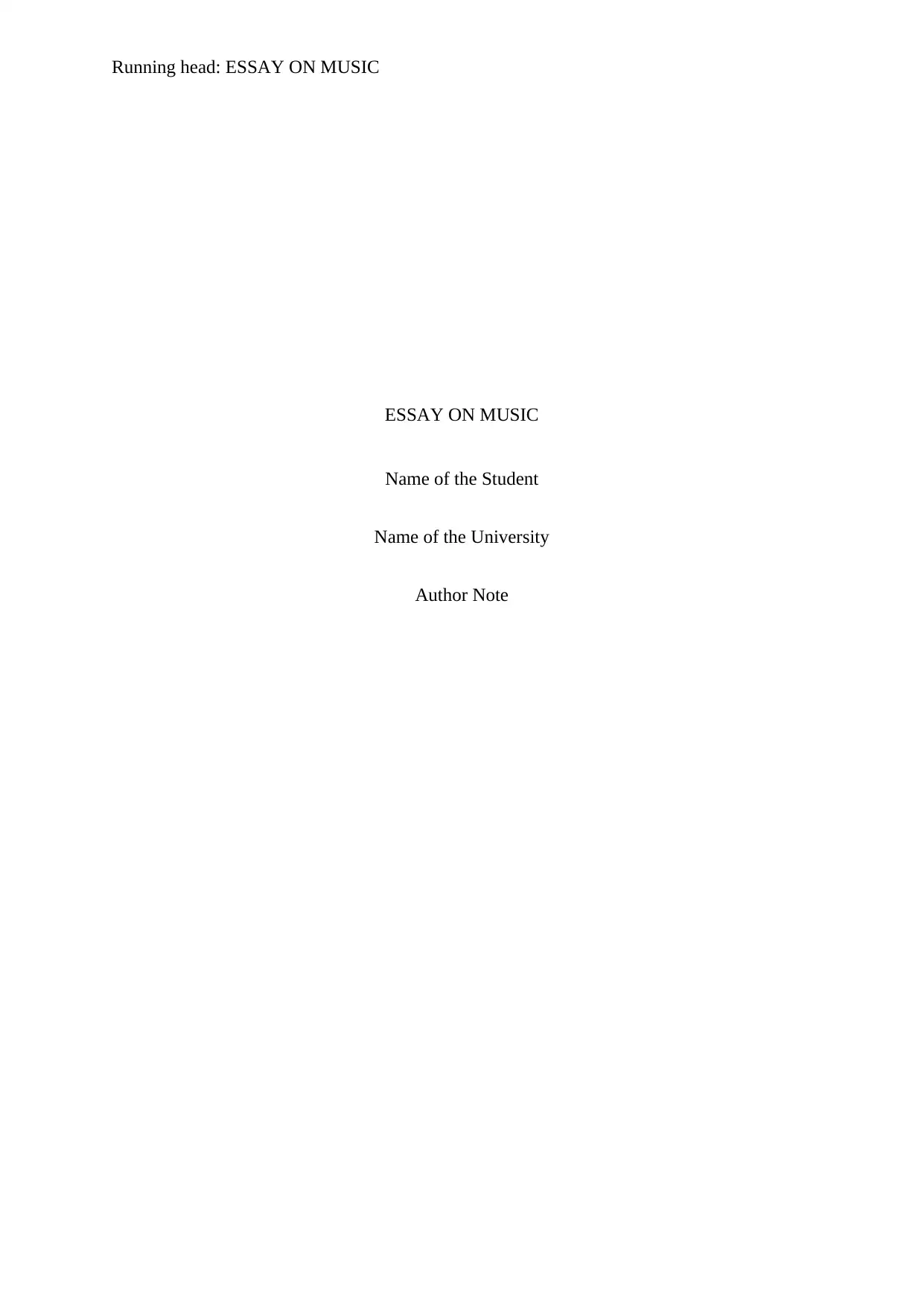
Running head: ESSAY ON MUSIC
ESSAY ON MUSIC
Name of the Student
Name of the University
Author Note
ESSAY ON MUSIC
Name of the Student
Name of the University
Author Note
Paraphrase This Document
Need a fresh take? Get an instant paraphrase of this document with our AI Paraphraser
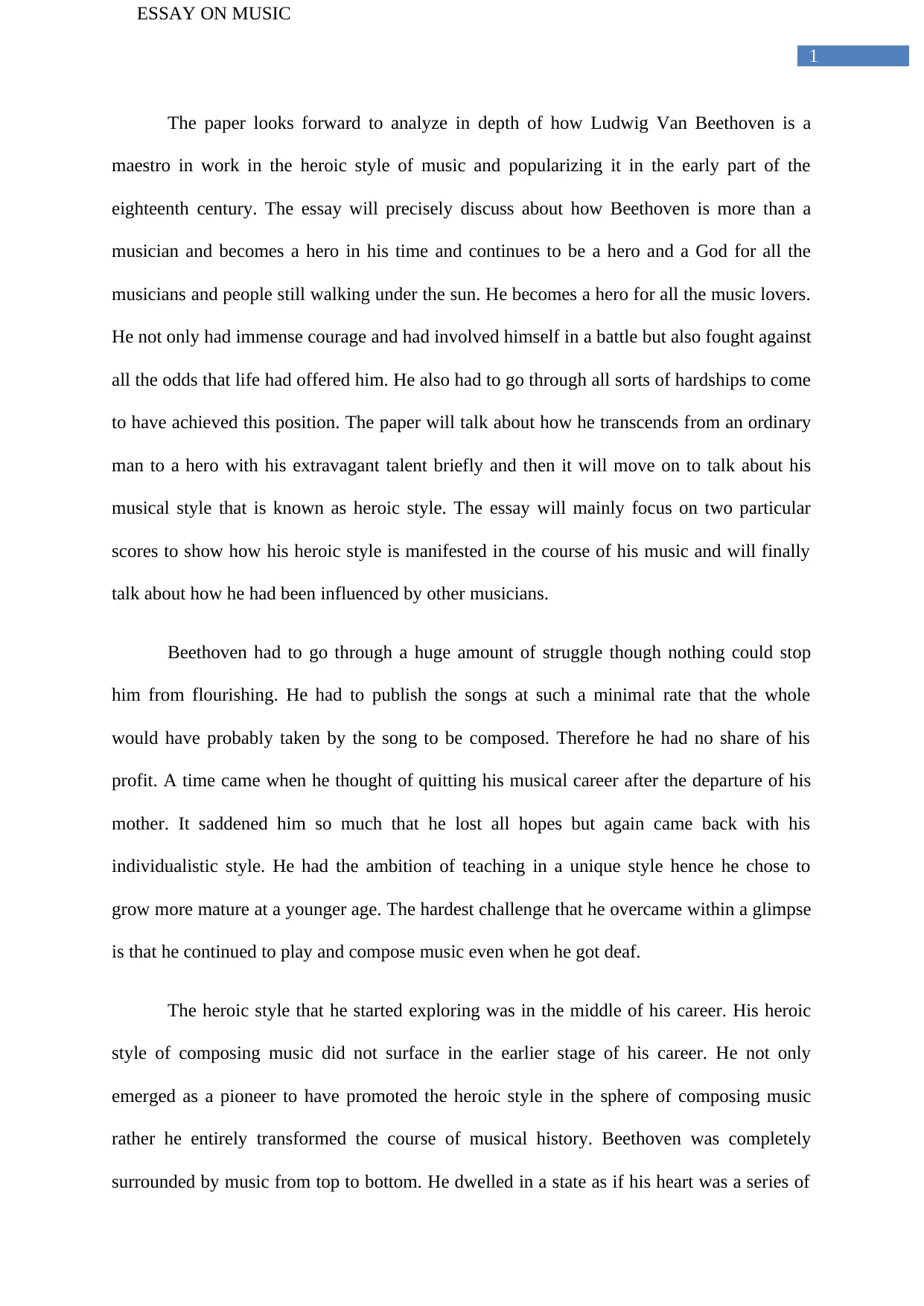
1
ESSAY ON MUSIC
The paper looks forward to analyze in depth of how Ludwig Van Beethoven is a
maestro in work in the heroic style of music and popularizing it in the early part of the
eighteenth century. The essay will precisely discuss about how Beethoven is more than a
musician and becomes a hero in his time and continues to be a hero and a God for all the
musicians and people still walking under the sun. He becomes a hero for all the music lovers.
He not only had immense courage and had involved himself in a battle but also fought against
all the odds that life had offered him. He also had to go through all sorts of hardships to come
to have achieved this position. The paper will talk about how he transcends from an ordinary
man to a hero with his extravagant talent briefly and then it will move on to talk about his
musical style that is known as heroic style. The essay will mainly focus on two particular
scores to show how his heroic style is manifested in the course of his music and will finally
talk about how he had been influenced by other musicians.
Beethoven had to go through a huge amount of struggle though nothing could stop
him from flourishing. He had to publish the songs at such a minimal rate that the whole
would have probably taken by the song to be composed. Therefore he had no share of his
profit. A time came when he thought of quitting his musical career after the departure of his
mother. It saddened him so much that he lost all hopes but again came back with his
individualistic style. He had the ambition of teaching in a unique style hence he chose to
grow more mature at a younger age. The hardest challenge that he overcame within a glimpse
is that he continued to play and compose music even when he got deaf.
The heroic style that he started exploring was in the middle of his career. His heroic
style of composing music did not surface in the earlier stage of his career. He not only
emerged as a pioneer to have promoted the heroic style in the sphere of composing music
rather he entirely transformed the course of musical history. Beethoven was completely
surrounded by music from top to bottom. He dwelled in a state as if his heart was a series of
ESSAY ON MUSIC
The paper looks forward to analyze in depth of how Ludwig Van Beethoven is a
maestro in work in the heroic style of music and popularizing it in the early part of the
eighteenth century. The essay will precisely discuss about how Beethoven is more than a
musician and becomes a hero in his time and continues to be a hero and a God for all the
musicians and people still walking under the sun. He becomes a hero for all the music lovers.
He not only had immense courage and had involved himself in a battle but also fought against
all the odds that life had offered him. He also had to go through all sorts of hardships to come
to have achieved this position. The paper will talk about how he transcends from an ordinary
man to a hero with his extravagant talent briefly and then it will move on to talk about his
musical style that is known as heroic style. The essay will mainly focus on two particular
scores to show how his heroic style is manifested in the course of his music and will finally
talk about how he had been influenced by other musicians.
Beethoven had to go through a huge amount of struggle though nothing could stop
him from flourishing. He had to publish the songs at such a minimal rate that the whole
would have probably taken by the song to be composed. Therefore he had no share of his
profit. A time came when he thought of quitting his musical career after the departure of his
mother. It saddened him so much that he lost all hopes but again came back with his
individualistic style. He had the ambition of teaching in a unique style hence he chose to
grow more mature at a younger age. The hardest challenge that he overcame within a glimpse
is that he continued to play and compose music even when he got deaf.
The heroic style that he started exploring was in the middle of his career. His heroic
style of composing music did not surface in the earlier stage of his career. He not only
emerged as a pioneer to have promoted the heroic style in the sphere of composing music
rather he entirely transformed the course of musical history. Beethoven was completely
surrounded by music from top to bottom. He dwelled in a state as if his heart was a series of
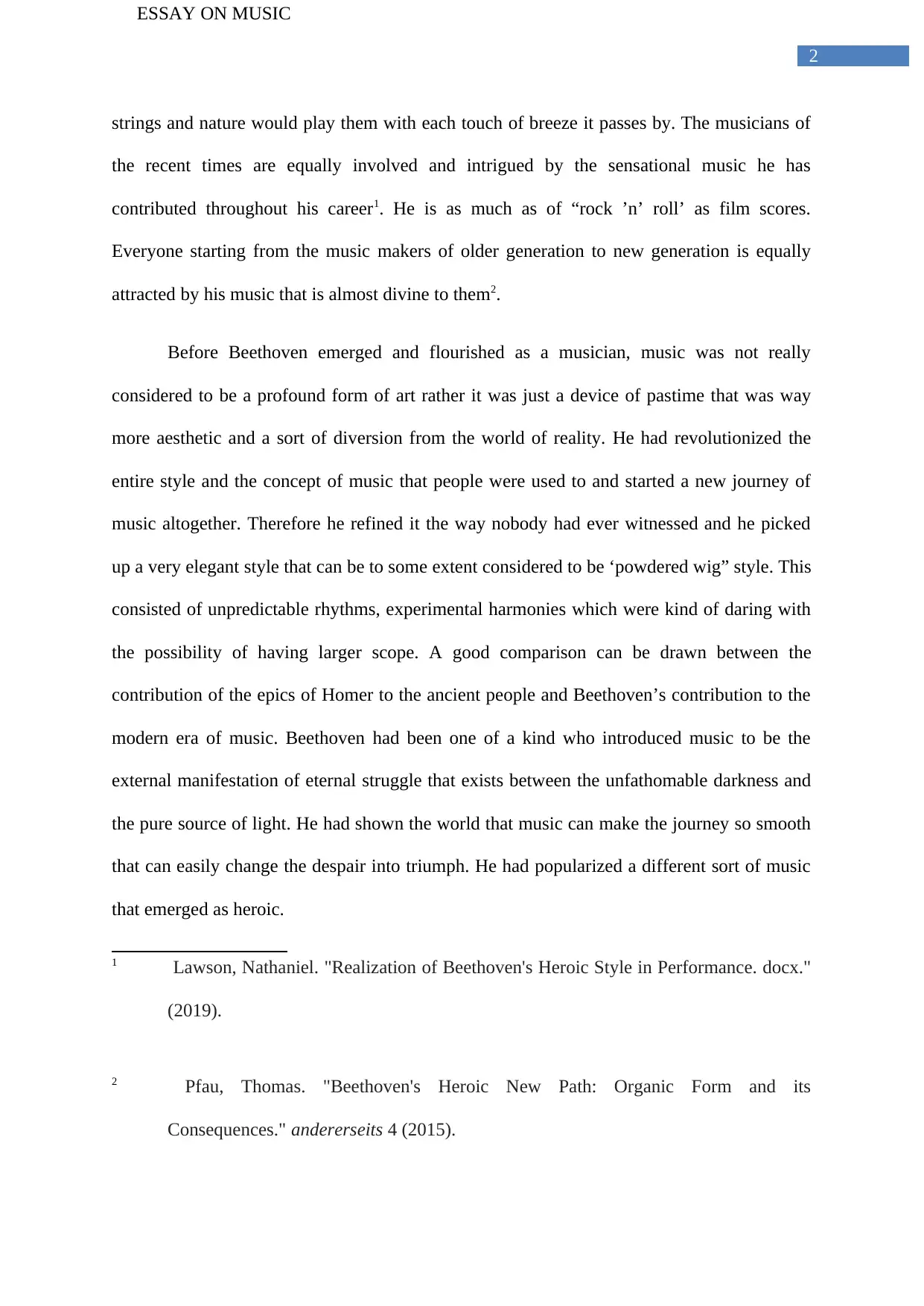
2
ESSAY ON MUSIC
strings and nature would play them with each touch of breeze it passes by. The musicians of
the recent times are equally involved and intrigued by the sensational music he has
contributed throughout his career1. He is as much as of “rock ’n’ roll’ as film scores.
Everyone starting from the music makers of older generation to new generation is equally
attracted by his music that is almost divine to them2.
Before Beethoven emerged and flourished as a musician, music was not really
considered to be a profound form of art rather it was just a device of pastime that was way
more aesthetic and a sort of diversion from the world of reality. He had revolutionized the
entire style and the concept of music that people were used to and started a new journey of
music altogether. Therefore he refined it the way nobody had ever witnessed and he picked
up a very elegant style that can be to some extent considered to be ‘powdered wig” style. This
consisted of unpredictable rhythms, experimental harmonies which were kind of daring with
the possibility of having larger scope. A good comparison can be drawn between the
contribution of the epics of Homer to the ancient people and Beethoven’s contribution to the
modern era of music. Beethoven had been one of a kind who introduced music to be the
external manifestation of eternal struggle that exists between the unfathomable darkness and
the pure source of light. He had shown the world that music can make the journey so smooth
that can easily change the despair into triumph. He had popularized a different sort of music
that emerged as heroic.
1 Lawson, Nathaniel. "Realization of Beethoven's Heroic Style in Performance. docx."
(2019).
2 Pfau, Thomas. "Beethoven's Heroic New Path: Organic Form and its
Consequences." andererseits 4 (2015).
ESSAY ON MUSIC
strings and nature would play them with each touch of breeze it passes by. The musicians of
the recent times are equally involved and intrigued by the sensational music he has
contributed throughout his career1. He is as much as of “rock ’n’ roll’ as film scores.
Everyone starting from the music makers of older generation to new generation is equally
attracted by his music that is almost divine to them2.
Before Beethoven emerged and flourished as a musician, music was not really
considered to be a profound form of art rather it was just a device of pastime that was way
more aesthetic and a sort of diversion from the world of reality. He had revolutionized the
entire style and the concept of music that people were used to and started a new journey of
music altogether. Therefore he refined it the way nobody had ever witnessed and he picked
up a very elegant style that can be to some extent considered to be ‘powdered wig” style. This
consisted of unpredictable rhythms, experimental harmonies which were kind of daring with
the possibility of having larger scope. A good comparison can be drawn between the
contribution of the epics of Homer to the ancient people and Beethoven’s contribution to the
modern era of music. Beethoven had been one of a kind who introduced music to be the
external manifestation of eternal struggle that exists between the unfathomable darkness and
the pure source of light. He had shown the world that music can make the journey so smooth
that can easily change the despair into triumph. He had popularized a different sort of music
that emerged as heroic.
1 Lawson, Nathaniel. "Realization of Beethoven's Heroic Style in Performance. docx."
(2019).
2 Pfau, Thomas. "Beethoven's Heroic New Path: Organic Form and its
Consequences." andererseits 4 (2015).
⊘ This is a preview!⊘
Do you want full access?
Subscribe today to unlock all pages.

Trusted by 1+ million students worldwide
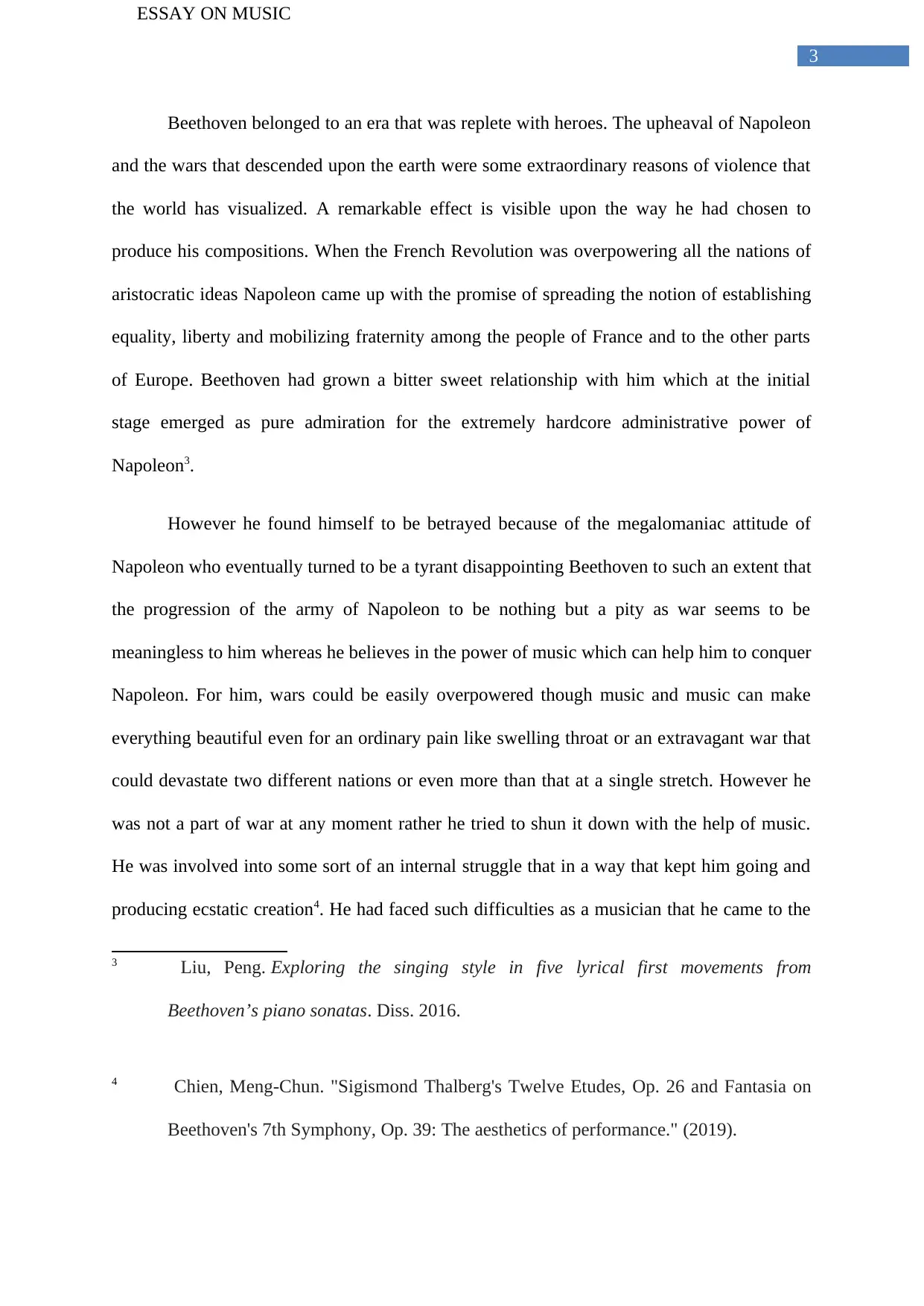
3
ESSAY ON MUSIC
Beethoven belonged to an era that was replete with heroes. The upheaval of Napoleon
and the wars that descended upon the earth were some extraordinary reasons of violence that
the world has visualized. A remarkable effect is visible upon the way he had chosen to
produce his compositions. When the French Revolution was overpowering all the nations of
aristocratic ideas Napoleon came up with the promise of spreading the notion of establishing
equality, liberty and mobilizing fraternity among the people of France and to the other parts
of Europe. Beethoven had grown a bitter sweet relationship with him which at the initial
stage emerged as pure admiration for the extremely hardcore administrative power of
Napoleon3.
However he found himself to be betrayed because of the megalomaniac attitude of
Napoleon who eventually turned to be a tyrant disappointing Beethoven to such an extent that
the progression of the army of Napoleon to be nothing but a pity as war seems to be
meaningless to him whereas he believes in the power of music which can help him to conquer
Napoleon. For him, wars could be easily overpowered though music and music can make
everything beautiful even for an ordinary pain like swelling throat or an extravagant war that
could devastate two different nations or even more than that at a single stretch. However he
was not a part of war at any moment rather he tried to shun it down with the help of music.
He was involved into some sort of an internal struggle that in a way that kept him going and
producing ecstatic creation4. He had faced such difficulties as a musician that he came to the
3 Liu, Peng. Exploring the singing style in five lyrical first movements from
Beethoven’s piano sonatas. Diss. 2016.
4 Chien, Meng-Chun. "Sigismond Thalberg's Twelve Etudes, Op. 26 and Fantasia on
Beethoven's 7th Symphony, Op. 39: The aesthetics of performance." (2019).
ESSAY ON MUSIC
Beethoven belonged to an era that was replete with heroes. The upheaval of Napoleon
and the wars that descended upon the earth were some extraordinary reasons of violence that
the world has visualized. A remarkable effect is visible upon the way he had chosen to
produce his compositions. When the French Revolution was overpowering all the nations of
aristocratic ideas Napoleon came up with the promise of spreading the notion of establishing
equality, liberty and mobilizing fraternity among the people of France and to the other parts
of Europe. Beethoven had grown a bitter sweet relationship with him which at the initial
stage emerged as pure admiration for the extremely hardcore administrative power of
Napoleon3.
However he found himself to be betrayed because of the megalomaniac attitude of
Napoleon who eventually turned to be a tyrant disappointing Beethoven to such an extent that
the progression of the army of Napoleon to be nothing but a pity as war seems to be
meaningless to him whereas he believes in the power of music which can help him to conquer
Napoleon. For him, wars could be easily overpowered though music and music can make
everything beautiful even for an ordinary pain like swelling throat or an extravagant war that
could devastate two different nations or even more than that at a single stretch. However he
was not a part of war at any moment rather he tried to shun it down with the help of music.
He was involved into some sort of an internal struggle that in a way that kept him going and
producing ecstatic creation4. He had faced such difficulties as a musician that he came to the
3 Liu, Peng. Exploring the singing style in five lyrical first movements from
Beethoven’s piano sonatas. Diss. 2016.
4 Chien, Meng-Chun. "Sigismond Thalberg's Twelve Etudes, Op. 26 and Fantasia on
Beethoven's 7th Symphony, Op. 39: The aesthetics of performance." (2019).
Paraphrase This Document
Need a fresh take? Get an instant paraphrase of this document with our AI Paraphraser
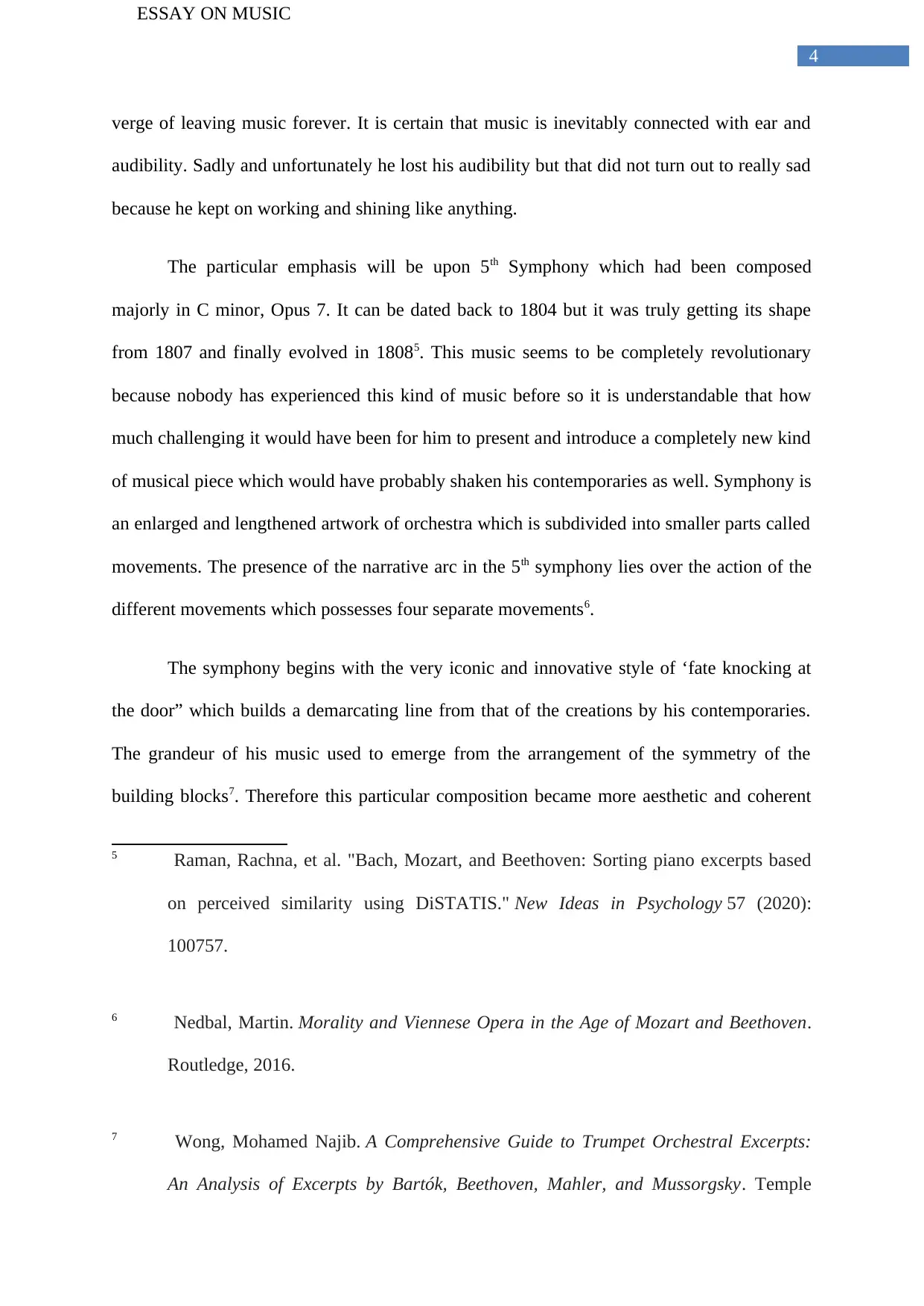
4
ESSAY ON MUSIC
verge of leaving music forever. It is certain that music is inevitably connected with ear and
audibility. Sadly and unfortunately he lost his audibility but that did not turn out to really sad
because he kept on working and shining like anything.
The particular emphasis will be upon 5th Symphony which had been composed
majorly in C minor, Opus 7. It can be dated back to 1804 but it was truly getting its shape
from 1807 and finally evolved in 18085. This music seems to be completely revolutionary
because nobody has experienced this kind of music before so it is understandable that how
much challenging it would have been for him to present and introduce a completely new kind
of musical piece which would have probably shaken his contemporaries as well. Symphony is
an enlarged and lengthened artwork of orchestra which is subdivided into smaller parts called
movements. The presence of the narrative arc in the 5th symphony lies over the action of the
different movements which possesses four separate movements6.
The symphony begins with the very iconic and innovative style of ‘fate knocking at
the door” which builds a demarcating line from that of the creations by his contemporaries.
The grandeur of his music used to emerge from the arrangement of the symmetry of the
building blocks7. Therefore this particular composition became more aesthetic and coherent
5 Raman, Rachna, et al. "Bach, Mozart, and Beethoven: Sorting piano excerpts based
on perceived similarity using DiSTATIS." New Ideas in Psychology 57 (2020):
100757.
6 Nedbal, Martin. Morality and Viennese Opera in the Age of Mozart and Beethoven.
Routledge, 2016.
7 Wong, Mohamed Najib. A Comprehensive Guide to Trumpet Orchestral Excerpts:
An Analysis of Excerpts by Bartók, Beethoven, Mahler, and Mussorgsky. Temple
ESSAY ON MUSIC
verge of leaving music forever. It is certain that music is inevitably connected with ear and
audibility. Sadly and unfortunately he lost his audibility but that did not turn out to really sad
because he kept on working and shining like anything.
The particular emphasis will be upon 5th Symphony which had been composed
majorly in C minor, Opus 7. It can be dated back to 1804 but it was truly getting its shape
from 1807 and finally evolved in 18085. This music seems to be completely revolutionary
because nobody has experienced this kind of music before so it is understandable that how
much challenging it would have been for him to present and introduce a completely new kind
of musical piece which would have probably shaken his contemporaries as well. Symphony is
an enlarged and lengthened artwork of orchestra which is subdivided into smaller parts called
movements. The presence of the narrative arc in the 5th symphony lies over the action of the
different movements which possesses four separate movements6.
The symphony begins with the very iconic and innovative style of ‘fate knocking at
the door” which builds a demarcating line from that of the creations by his contemporaries.
The grandeur of his music used to emerge from the arrangement of the symmetry of the
building blocks7. Therefore this particular composition became more aesthetic and coherent
5 Raman, Rachna, et al. "Bach, Mozart, and Beethoven: Sorting piano excerpts based
on perceived similarity using DiSTATIS." New Ideas in Psychology 57 (2020):
100757.
6 Nedbal, Martin. Morality and Viennese Opera in the Age of Mozart and Beethoven.
Routledge, 2016.
7 Wong, Mohamed Najib. A Comprehensive Guide to Trumpet Orchestral Excerpts:
An Analysis of Excerpts by Bartók, Beethoven, Mahler, and Mussorgsky. Temple
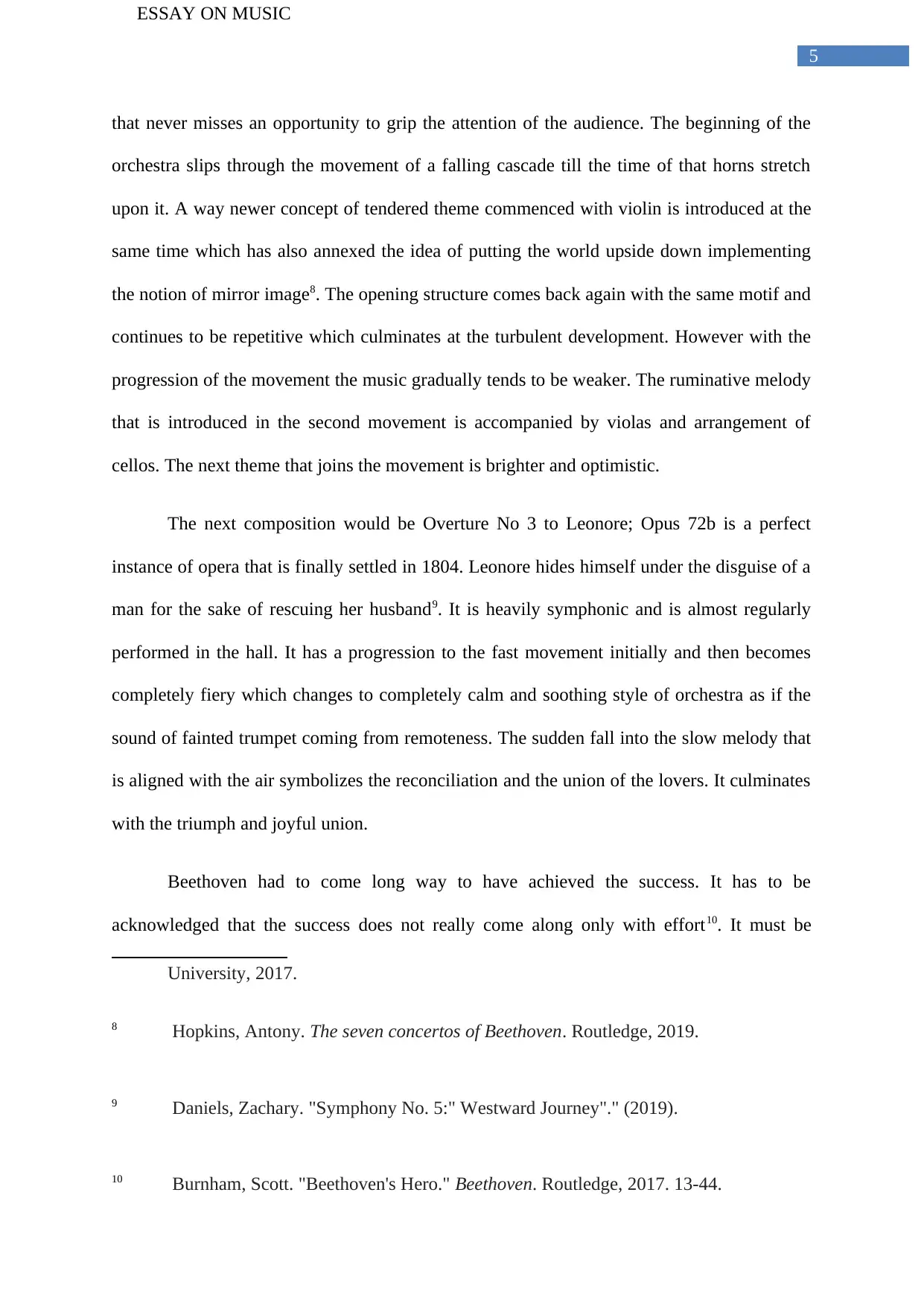
5
ESSAY ON MUSIC
that never misses an opportunity to grip the attention of the audience. The beginning of the
orchestra slips through the movement of a falling cascade till the time of that horns stretch
upon it. A way newer concept of tendered theme commenced with violin is introduced at the
same time which has also annexed the idea of putting the world upside down implementing
the notion of mirror image8. The opening structure comes back again with the same motif and
continues to be repetitive which culminates at the turbulent development. However with the
progression of the movement the music gradually tends to be weaker. The ruminative melody
that is introduced in the second movement is accompanied by violas and arrangement of
cellos. The next theme that joins the movement is brighter and optimistic.
The next composition would be Overture No 3 to Leonore; Opus 72b is a perfect
instance of opera that is finally settled in 1804. Leonore hides himself under the disguise of a
man for the sake of rescuing her husband9. It is heavily symphonic and is almost regularly
performed in the hall. It has a progression to the fast movement initially and then becomes
completely fiery which changes to completely calm and soothing style of orchestra as if the
sound of fainted trumpet coming from remoteness. The sudden fall into the slow melody that
is aligned with the air symbolizes the reconciliation and the union of the lovers. It culminates
with the triumph and joyful union.
Beethoven had to come long way to have achieved the success. It has to be
acknowledged that the success does not really come along only with effort10. It must be
University, 2017.
8 Hopkins, Antony. The seven concertos of Beethoven. Routledge, 2019.
9 Daniels, Zachary. "Symphony No. 5:" Westward Journey"." (2019).
10 Burnham, Scott. "Beethoven's Hero." Beethoven. Routledge, 2017. 13-44.
ESSAY ON MUSIC
that never misses an opportunity to grip the attention of the audience. The beginning of the
orchestra slips through the movement of a falling cascade till the time of that horns stretch
upon it. A way newer concept of tendered theme commenced with violin is introduced at the
same time which has also annexed the idea of putting the world upside down implementing
the notion of mirror image8. The opening structure comes back again with the same motif and
continues to be repetitive which culminates at the turbulent development. However with the
progression of the movement the music gradually tends to be weaker. The ruminative melody
that is introduced in the second movement is accompanied by violas and arrangement of
cellos. The next theme that joins the movement is brighter and optimistic.
The next composition would be Overture No 3 to Leonore; Opus 72b is a perfect
instance of opera that is finally settled in 1804. Leonore hides himself under the disguise of a
man for the sake of rescuing her husband9. It is heavily symphonic and is almost regularly
performed in the hall. It has a progression to the fast movement initially and then becomes
completely fiery which changes to completely calm and soothing style of orchestra as if the
sound of fainted trumpet coming from remoteness. The sudden fall into the slow melody that
is aligned with the air symbolizes the reconciliation and the union of the lovers. It culminates
with the triumph and joyful union.
Beethoven had to come long way to have achieved the success. It has to be
acknowledged that the success does not really come along only with effort10. It must be
University, 2017.
8 Hopkins, Antony. The seven concertos of Beethoven. Routledge, 2019.
9 Daniels, Zachary. "Symphony No. 5:" Westward Journey"." (2019).
10 Burnham, Scott. "Beethoven's Hero." Beethoven. Routledge, 2017. 13-44.
⊘ This is a preview!⊘
Do you want full access?
Subscribe today to unlock all pages.

Trusted by 1+ million students worldwide
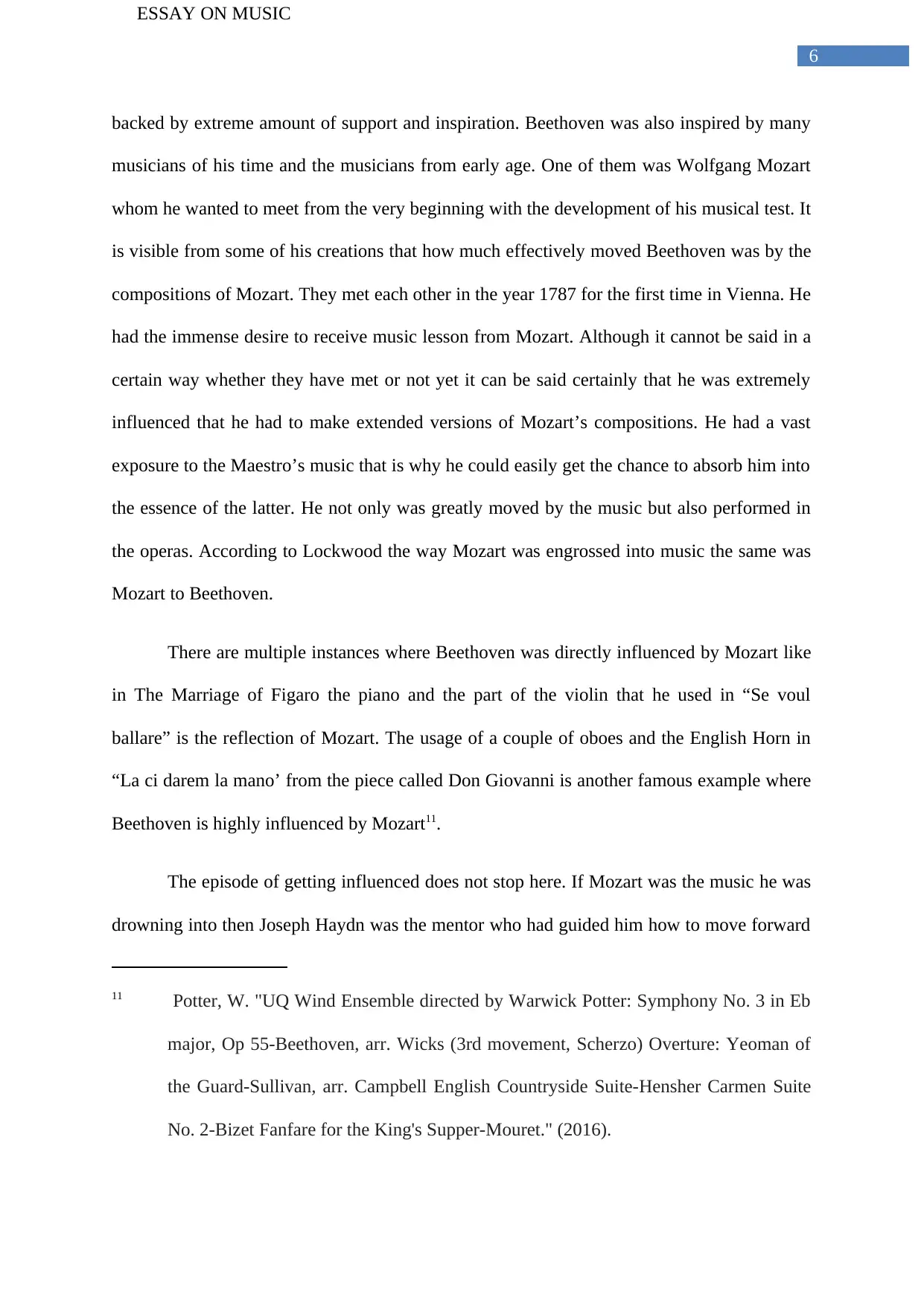
6
ESSAY ON MUSIC
backed by extreme amount of support and inspiration. Beethoven was also inspired by many
musicians of his time and the musicians from early age. One of them was Wolfgang Mozart
whom he wanted to meet from the very beginning with the development of his musical test. It
is visible from some of his creations that how much effectively moved Beethoven was by the
compositions of Mozart. They met each other in the year 1787 for the first time in Vienna. He
had the immense desire to receive music lesson from Mozart. Although it cannot be said in a
certain way whether they have met or not yet it can be said certainly that he was extremely
influenced that he had to make extended versions of Mozart’s compositions. He had a vast
exposure to the Maestro’s music that is why he could easily get the chance to absorb him into
the essence of the latter. He not only was greatly moved by the music but also performed in
the operas. According to Lockwood the way Mozart was engrossed into music the same was
Mozart to Beethoven.
There are multiple instances where Beethoven was directly influenced by Mozart like
in The Marriage of Figaro the piano and the part of the violin that he used in “Se voul
ballare” is the reflection of Mozart. The usage of a couple of oboes and the English Horn in
“La ci darem la mano’ from the piece called Don Giovanni is another famous example where
Beethoven is highly influenced by Mozart11.
The episode of getting influenced does not stop here. If Mozart was the music he was
drowning into then Joseph Haydn was the mentor who had guided him how to move forward
11 Potter, W. "UQ Wind Ensemble directed by Warwick Potter: Symphony No. 3 in Eb
major, Op 55-Beethoven, arr. Wicks (3rd movement, Scherzo) Overture: Yeoman of
the Guard-Sullivan, arr. Campbell English Countryside Suite-Hensher Carmen Suite
No. 2-Bizet Fanfare for the King's Supper-Mouret." (2016).
ESSAY ON MUSIC
backed by extreme amount of support and inspiration. Beethoven was also inspired by many
musicians of his time and the musicians from early age. One of them was Wolfgang Mozart
whom he wanted to meet from the very beginning with the development of his musical test. It
is visible from some of his creations that how much effectively moved Beethoven was by the
compositions of Mozart. They met each other in the year 1787 for the first time in Vienna. He
had the immense desire to receive music lesson from Mozart. Although it cannot be said in a
certain way whether they have met or not yet it can be said certainly that he was extremely
influenced that he had to make extended versions of Mozart’s compositions. He had a vast
exposure to the Maestro’s music that is why he could easily get the chance to absorb him into
the essence of the latter. He not only was greatly moved by the music but also performed in
the operas. According to Lockwood the way Mozart was engrossed into music the same was
Mozart to Beethoven.
There are multiple instances where Beethoven was directly influenced by Mozart like
in The Marriage of Figaro the piano and the part of the violin that he used in “Se voul
ballare” is the reflection of Mozart. The usage of a couple of oboes and the English Horn in
“La ci darem la mano’ from the piece called Don Giovanni is another famous example where
Beethoven is highly influenced by Mozart11.
The episode of getting influenced does not stop here. If Mozart was the music he was
drowning into then Joseph Haydn was the mentor who had guided him how to move forward
11 Potter, W. "UQ Wind Ensemble directed by Warwick Potter: Symphony No. 3 in Eb
major, Op 55-Beethoven, arr. Wicks (3rd movement, Scherzo) Overture: Yeoman of
the Guard-Sullivan, arr. Campbell English Countryside Suite-Hensher Carmen Suite
No. 2-Bizet Fanfare for the King's Supper-Mouret." (2016).
Paraphrase This Document
Need a fresh take? Get an instant paraphrase of this document with our AI Paraphraser
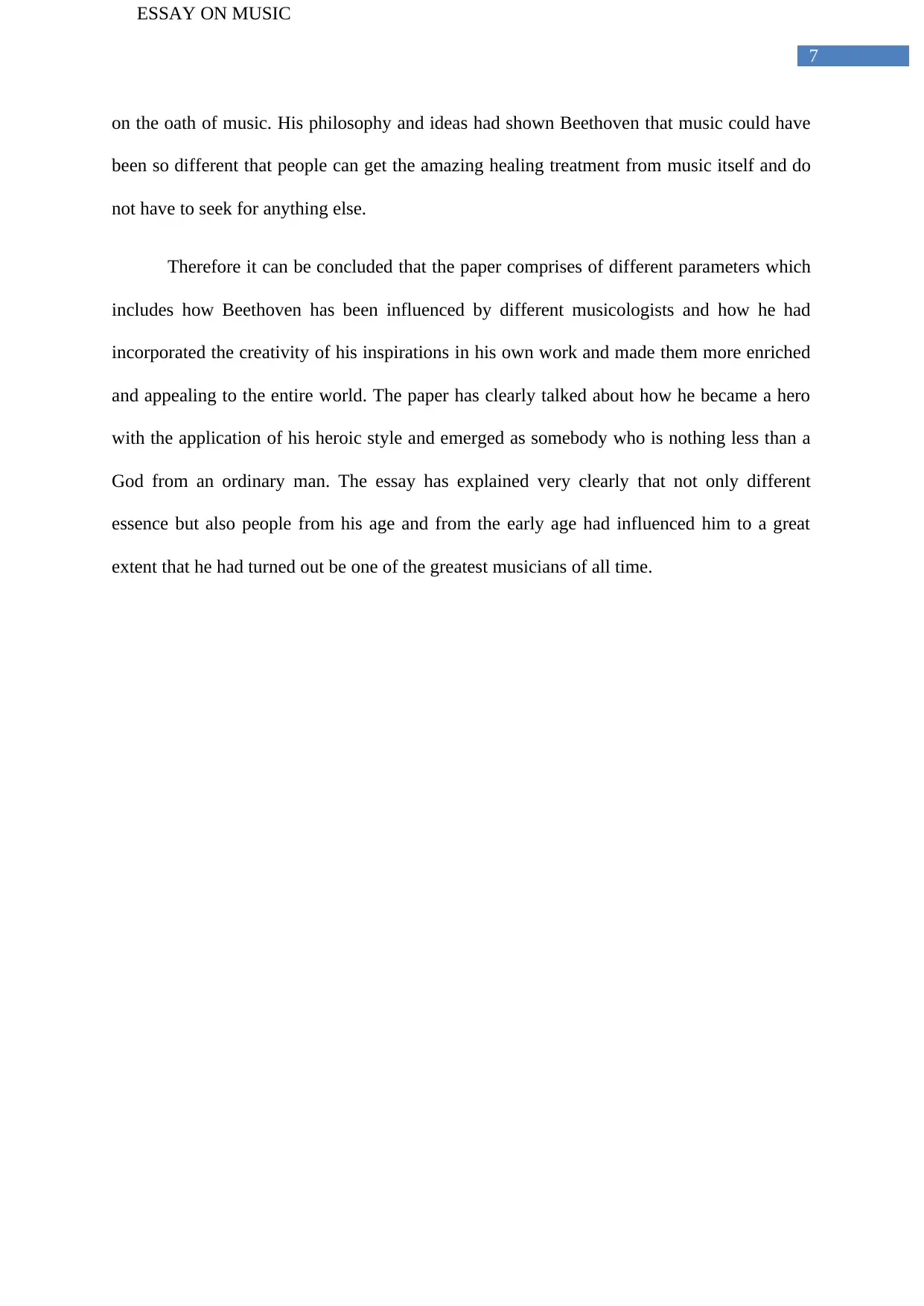
7
ESSAY ON MUSIC
on the oath of music. His philosophy and ideas had shown Beethoven that music could have
been so different that people can get the amazing healing treatment from music itself and do
not have to seek for anything else.
Therefore it can be concluded that the paper comprises of different parameters which
includes how Beethoven has been influenced by different musicologists and how he had
incorporated the creativity of his inspirations in his own work and made them more enriched
and appealing to the entire world. The paper has clearly talked about how he became a hero
with the application of his heroic style and emerged as somebody who is nothing less than a
God from an ordinary man. The essay has explained very clearly that not only different
essence but also people from his age and from the early age had influenced him to a great
extent that he had turned out be one of the greatest musicians of all time.
ESSAY ON MUSIC
on the oath of music. His philosophy and ideas had shown Beethoven that music could have
been so different that people can get the amazing healing treatment from music itself and do
not have to seek for anything else.
Therefore it can be concluded that the paper comprises of different parameters which
includes how Beethoven has been influenced by different musicologists and how he had
incorporated the creativity of his inspirations in his own work and made them more enriched
and appealing to the entire world. The paper has clearly talked about how he became a hero
with the application of his heroic style and emerged as somebody who is nothing less than a
God from an ordinary man. The essay has explained very clearly that not only different
essence but also people from his age and from the early age had influenced him to a great
extent that he had turned out be one of the greatest musicians of all time.
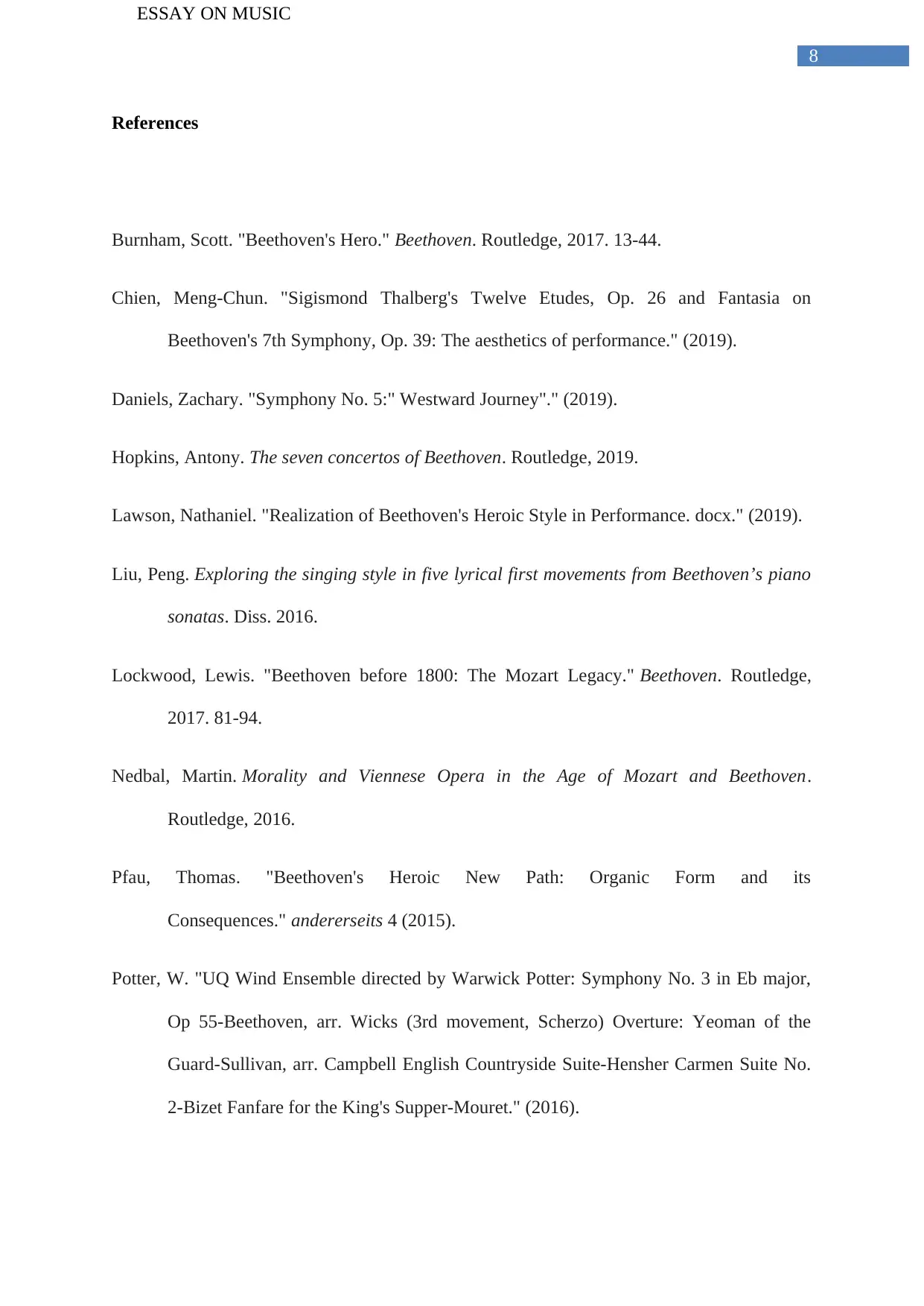
8
ESSAY ON MUSIC
References
Burnham, Scott. "Beethoven's Hero." Beethoven. Routledge, 2017. 13-44.
Chien, Meng-Chun. "Sigismond Thalberg's Twelve Etudes, Op. 26 and Fantasia on
Beethoven's 7th Symphony, Op. 39: The aesthetics of performance." (2019).
Daniels, Zachary. "Symphony No. 5:" Westward Journey"." (2019).
Hopkins, Antony. The seven concertos of Beethoven. Routledge, 2019.
Lawson, Nathaniel. "Realization of Beethoven's Heroic Style in Performance. docx." (2019).
Liu, Peng. Exploring the singing style in five lyrical first movements from Beethoven’s piano
sonatas. Diss. 2016.
Lockwood, Lewis. "Beethoven before 1800: The Mozart Legacy." Beethoven. Routledge,
2017. 81-94.
Nedbal, Martin. Morality and Viennese Opera in the Age of Mozart and Beethoven.
Routledge, 2016.
Pfau, Thomas. "Beethoven's Heroic New Path: Organic Form and its
Consequences." andererseits 4 (2015).
Potter, W. "UQ Wind Ensemble directed by Warwick Potter: Symphony No. 3 in Eb major,
Op 55-Beethoven, arr. Wicks (3rd movement, Scherzo) Overture: Yeoman of the
Guard-Sullivan, arr. Campbell English Countryside Suite-Hensher Carmen Suite No.
2-Bizet Fanfare for the King's Supper-Mouret." (2016).
ESSAY ON MUSIC
References
Burnham, Scott. "Beethoven's Hero." Beethoven. Routledge, 2017. 13-44.
Chien, Meng-Chun. "Sigismond Thalberg's Twelve Etudes, Op. 26 and Fantasia on
Beethoven's 7th Symphony, Op. 39: The aesthetics of performance." (2019).
Daniels, Zachary. "Symphony No. 5:" Westward Journey"." (2019).
Hopkins, Antony. The seven concertos of Beethoven. Routledge, 2019.
Lawson, Nathaniel. "Realization of Beethoven's Heroic Style in Performance. docx." (2019).
Liu, Peng. Exploring the singing style in five lyrical first movements from Beethoven’s piano
sonatas. Diss. 2016.
Lockwood, Lewis. "Beethoven before 1800: The Mozart Legacy." Beethoven. Routledge,
2017. 81-94.
Nedbal, Martin. Morality and Viennese Opera in the Age of Mozart and Beethoven.
Routledge, 2016.
Pfau, Thomas. "Beethoven's Heroic New Path: Organic Form and its
Consequences." andererseits 4 (2015).
Potter, W. "UQ Wind Ensemble directed by Warwick Potter: Symphony No. 3 in Eb major,
Op 55-Beethoven, arr. Wicks (3rd movement, Scherzo) Overture: Yeoman of the
Guard-Sullivan, arr. Campbell English Countryside Suite-Hensher Carmen Suite No.
2-Bizet Fanfare for the King's Supper-Mouret." (2016).
⊘ This is a preview!⊘
Do you want full access?
Subscribe today to unlock all pages.

Trusted by 1+ million students worldwide
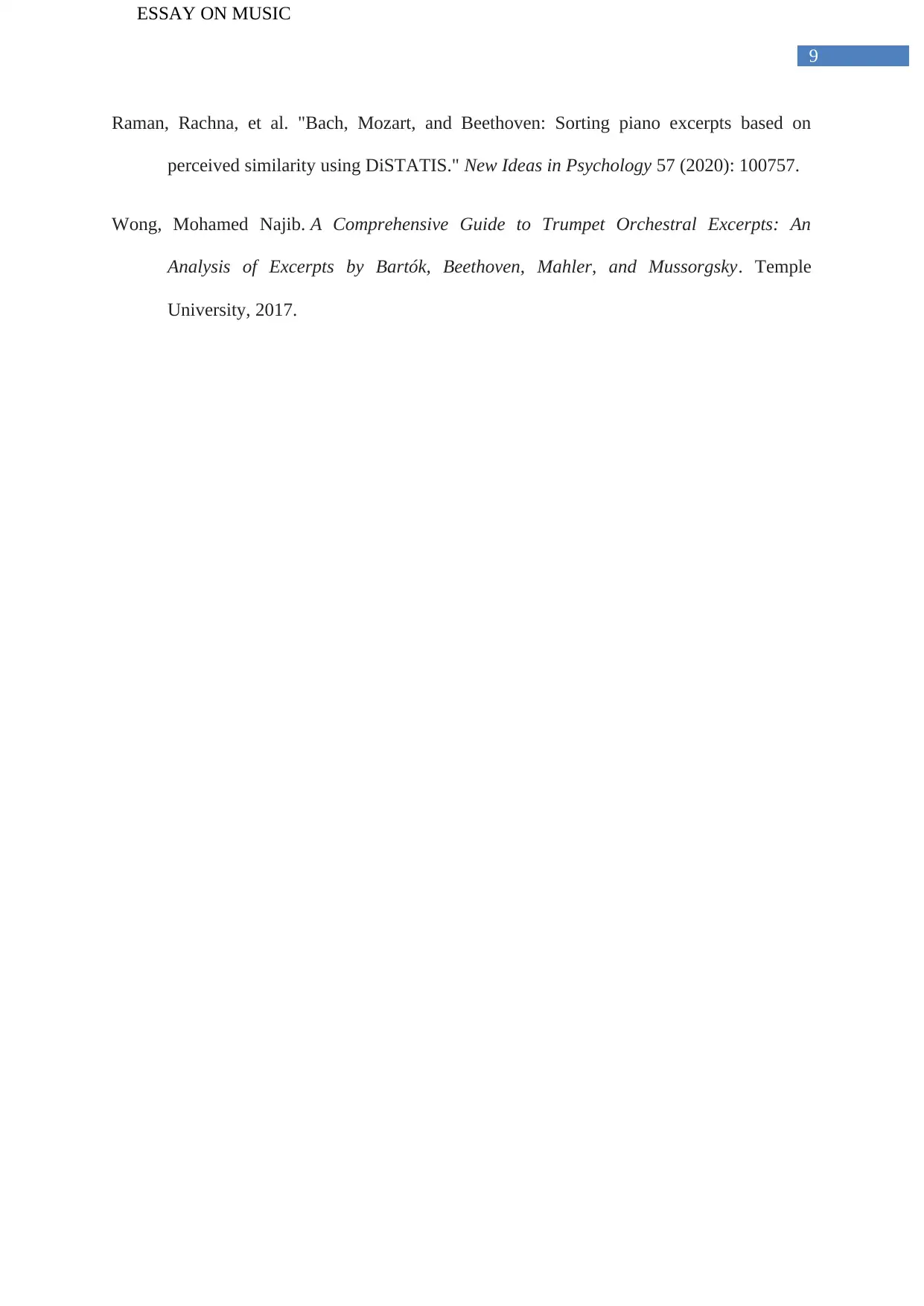
9
ESSAY ON MUSIC
Raman, Rachna, et al. "Bach, Mozart, and Beethoven: Sorting piano excerpts based on
perceived similarity using DiSTATIS." New Ideas in Psychology 57 (2020): 100757.
Wong, Mohamed Najib. A Comprehensive Guide to Trumpet Orchestral Excerpts: An
Analysis of Excerpts by Bartók, Beethoven, Mahler, and Mussorgsky. Temple
University, 2017.
ESSAY ON MUSIC
Raman, Rachna, et al. "Bach, Mozart, and Beethoven: Sorting piano excerpts based on
perceived similarity using DiSTATIS." New Ideas in Psychology 57 (2020): 100757.
Wong, Mohamed Najib. A Comprehensive Guide to Trumpet Orchestral Excerpts: An
Analysis of Excerpts by Bartók, Beethoven, Mahler, and Mussorgsky. Temple
University, 2017.
1 out of 10
Related Documents
Your All-in-One AI-Powered Toolkit for Academic Success.
+13062052269
info@desklib.com
Available 24*7 on WhatsApp / Email
![[object Object]](/_next/static/media/star-bottom.7253800d.svg)
Unlock your academic potential
Copyright © 2020–2025 A2Z Services. All Rights Reserved. Developed and managed by ZUCOL.





